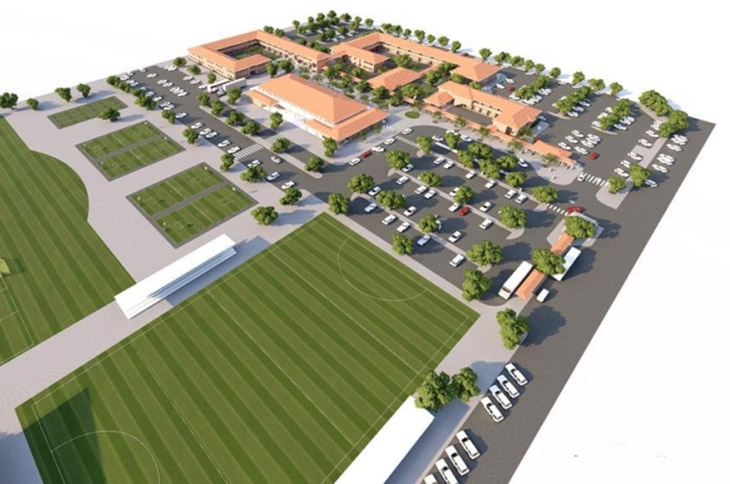The following articles and statements are provided for public information and copyright vests in the Development Bank of Namibia. For permission to use these items verbatim, or as excerpts, or for photographic permissions, please contact the Corporate Communications and Stakeholder Relationships Specialist on 061 290 8000.

Above: an architectural rendering of the Oshana Gymnasium.
Development Bank of Namibia (DBN) has announced that it has provided N$72.9 million in finance for two new Gymnasium private schools. One will be located in Ongwediva, Oshana. The other will be located in Walvis Bay, Erongo.
The Bank has developed a track record of finance for schools, health facilities and environmentally beneficial initiatives such as recycling.
Talking about the development benefits of the schools, DBN CEO Martin Inkumbi mentioned that in addition to the Bank’s commitment to finance larger social enterprises, the schools will provide 160 temporal employment opportunities during construction and several permanent jobs thereafter.
He added that the schools would also have their needs fulfilled by regional and national SMEs.
He went on to elaborate on specific regional benefits.
Describing the impact for Oshana, Inkumbi expressed hope that the school would instil in learners a love and appreciation of the region and its potential. This he hoped would lead them to complete their educations and return to Oshana to participate in and grow the regional economy.
He added that the availability of additional places in private sector schools would make Oshana an attractive residential locality for parents of school-going children, thereby adding to the pool of professionals and managers, participating in growing the regional economy of Oshana.
On the topic of impact for Erongo, Inkumbi said Walvis Bay will become a hub for Namibia’s future energy and industries. This will require engineers, managers, scientists, technicians, project planners and leaders. By shaping young minds, the Walvis Gymnasium will become part of the future of Erongo and Namibia.
He went on to challenge the Gymnasiums to extend their influence in their regions, by sharing knowledge and best educational practices with educators in the regions.
He also challenged the schools to spread the education to learners from lower income households by providing educational scholarships to gifted learners that ordinarily would not have the means to attend private schools.
Inkumbi said the Development Bank has recently inaugurated its Sustainable Finance Framework and added that in the near future the Bank will launch its first sustainability bond. This will represent an opportunity for investors to earn returns from finance for environmentally and socially beneficial enterprises.
The Gymnasiums in Oshana and Walvis Bay, he continued, are examples of the sort of projects that will benefit from the bond.
Inkumbi concluded that the Bank returns a portion of its earnings to provide schools that do not qualify for finance with the means to repair and improve their facilities as a part of its corporate social investment.
He gave the assurance that a portion of the Bank’s earnings allocated to CSI will add to the sum of benefits available to education.



